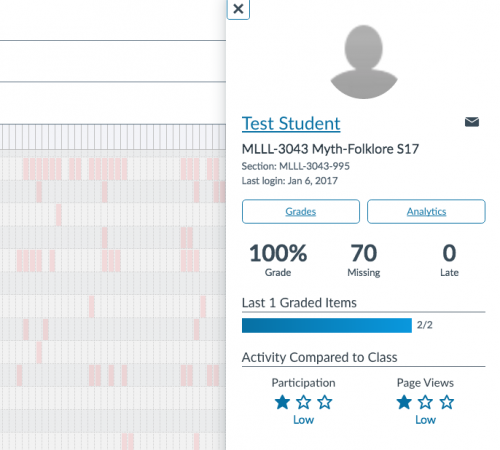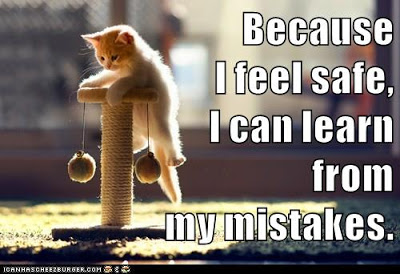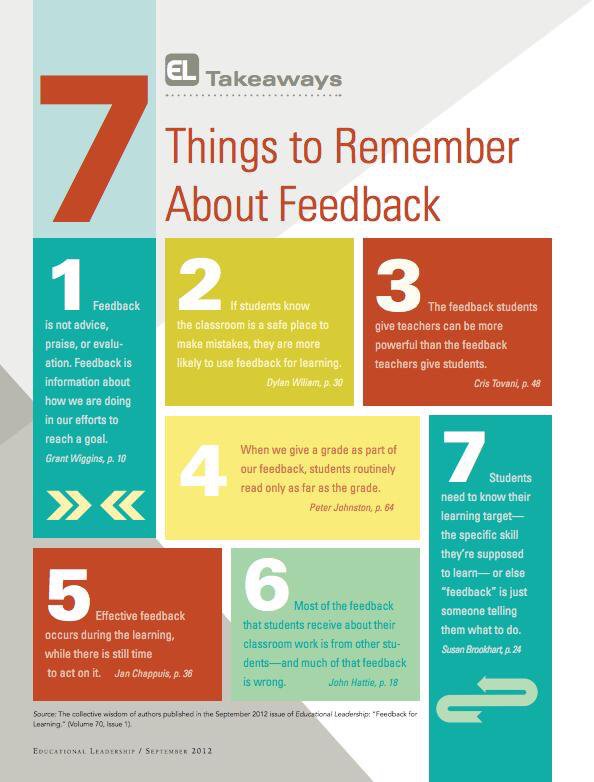More Visible Learning, NOT More Visible Grades
- Subscribe to RSS Feed
- Mark as New
- Mark as Read
- Bookmark
- Subscribe
- Printer Friendly Page
- Report Inappropriate Content
Last week I went to check to see if a student had completed some assignments from earlier in the semester, and when I clicked, I saw a new panel pop up; here's what it looks like for the Test Student:
From @Chris_Hofer I learned that this is a new "Student Context Card," and my school chose to turn it on (without telling us, which is odd) when it was released last week. Canvas has invested what is clearly a lot of effort and resources in order to give us this new gradebook view with information that shows me each student's latest graded items, ranking them compared to the rest of the class.
And I find this to be very depressing.
By emphasizing this "view" of students, Canvas shows us (the instructors, the students) that it really is all about the grades, ranking student against student. Not about the learning. Not about growth.
As I've documented elsewhere, I find the Canvas Gradebook to be mostly useless because I cannot include my own data fields ("Feature Request: Text Fields in the Gradebook"). In D2L, I could create little text fields to record important information about a student that I needed to remember (out with flu Weeks 3-4... needs Tuesday reminders... waiting on 2nd Portfolio story revisions... etc. etc.). Because the Canvas Gradebook refuses to let me enter information I consider important, I run my own spreadsheet outside the system. I definitely believe in analytics, but the data I need are not the grades: I need data about the whole student and about their learning process.
And that leads to my bigger concern here: by making it all about the grades, we are doing our students a huge disservice. We tell them to care about the grades as if the grades were a true representation of the learning. But we all know... if we are honest about it... that grades are a poor proxy for learning at best. And at worst, they are a huge hindrance to learning, a reward-and-punishment system that has negative consequences for many students. (Don't believe me? Read Carol Dweck.)
To learn more and to learn better, students need FEEDBACK. Lots of it. And grades are a terrible form of feedback.
I have written about this often; here are all the posts at my Teaching With Canvas blog labeled Grading, and I've also collected materials at Grading.MythFolklore.net, where you will find links and resources about the un-grading movement; see also the hashtag #TTOG (Teachers Throwing Out Grades) at Twitter.
Short version: I'm ALL-feedback and NO-grades. That has been my approach since I first started teaching online in 2002, and it works. How do I know it works? Because the students tell me it does: What Students Say About Un-Grading.
For information about what good feedback can and should be, check out my Feedback Resources at Diigo. Yep, that's an RSS feed inside a Canvas page... and RSS is just one technology we could be using to bring real evidence of student learning from their own webspaces into the Canvas space.
So, instead of a dynamic whiz-bang Gradebook view of students, we instead need a dynamic whiz-bang LEARNING view that helps students and instructors see what their learning looks like and that also allows them to connect with others based on what we are all learning together. To get a sense of the dynamics of connected, visible learning in my classes, take a look at the blog hubs for Myth-Folklore and Indian Epics. Take a look at the student projects, past and present at eStorybook Central.
I've also proposed creating a Connected Learning Group here at Canvas; if you are interested, let me know!
To help students learn more and learn better, I need to see what they are learning. To help them in their work, I need to see their work. Not quizzes, not tests. Their work.
The work, not the grades, is what matters, and I show the students that their work matters by giving them detailed feedback about it, by creating opportunities for them to share their work with others, and by saving their work in the class archives to sustain my classes in the future.
Grades penalize mistakes... feedback helps you learn from them. That's what we need: feedback, not grades.
Because I feel safe, I can learn from my mistakes.
A meme inspired by this infographic:
Crossposted at Canvas Community.
You must be a registered user to add a comment. If you've already registered, sign in. Otherwise, register and sign in.



